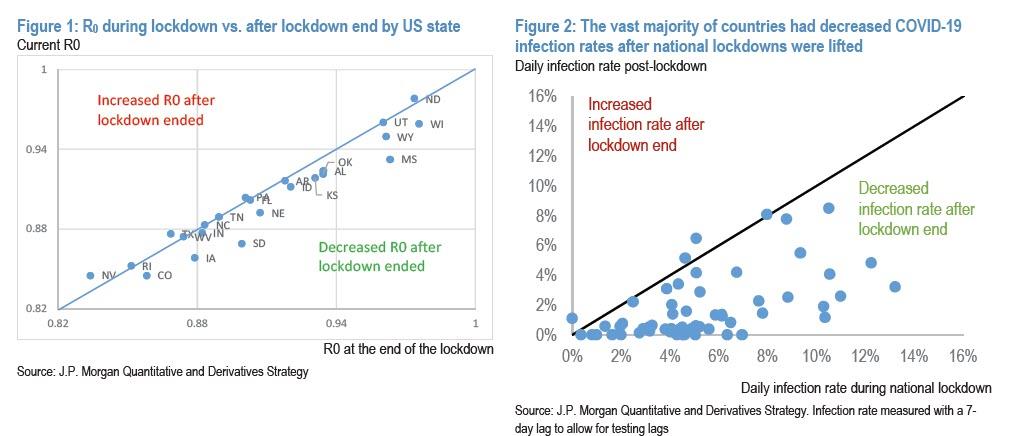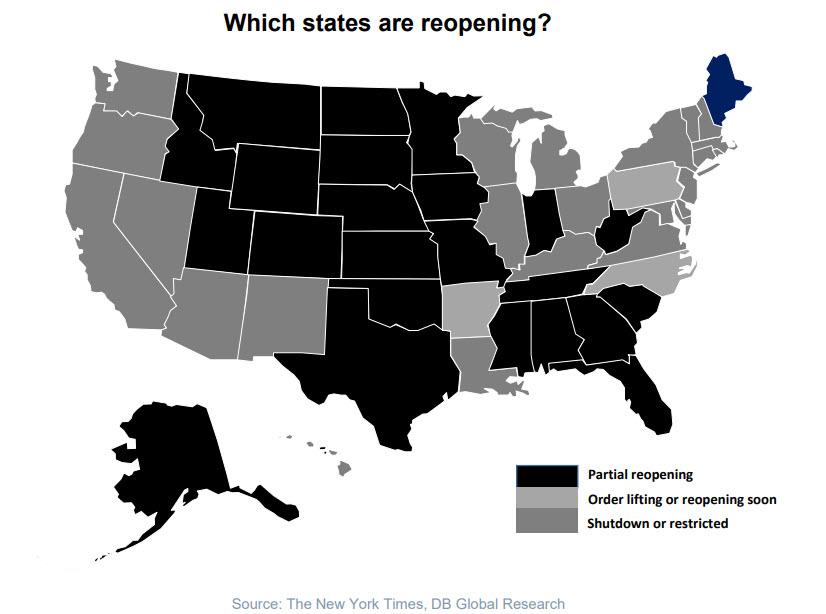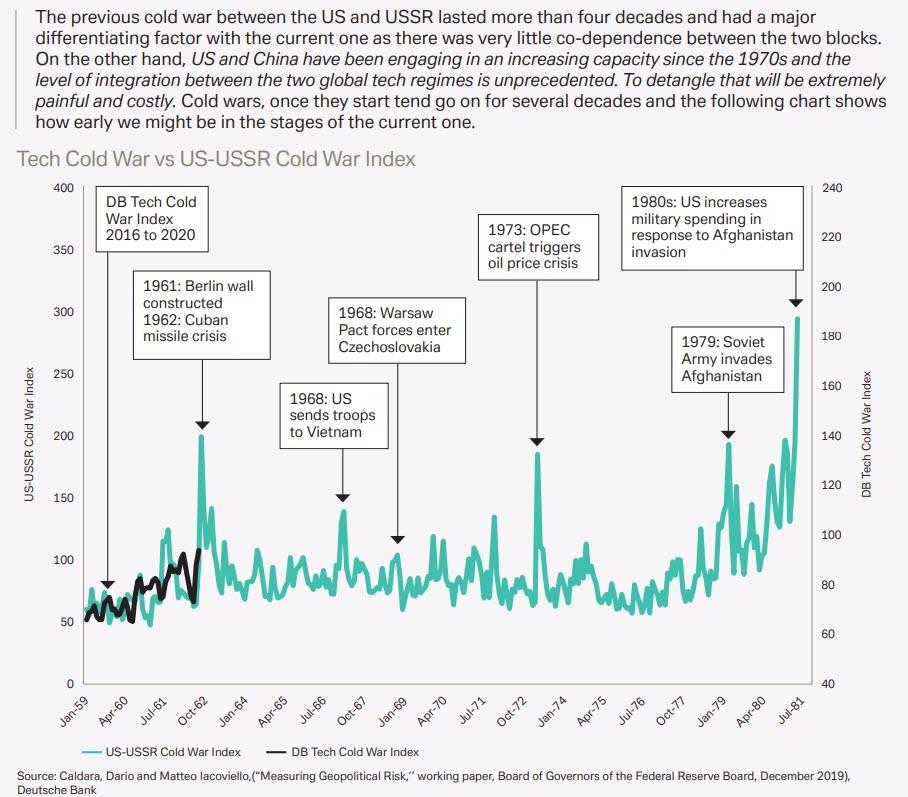A certain subset of financial commentators who despise Trump and his policies yet are fervent adherents of Marko Kolanovic will have a real "cognitive dissonance" trying to rationalize and comment on the JPM quant's latest observations on the coronavirus pandemic, in which he finds that "data favors further reopening" in line with what the administration is currently promoting.
Writing that "while the epidemic and markets largely followed our forecasts, politics emerged as a new and significant risk. Despite the conditions for re-opening being mostly met across the US" Kolanovic observes that this is "not yet happening in the largest economic regions (e.g. CA, NY, etc.)" Instead, while "the virus risk is abating globally, political/geopolitical fallout is emerging as a new risk. For example, just today the US senate passed a bill to bar Chinese companies from being listed on US exchanges."
Mocking "flawed scientific papers [which] predicted several million virus deaths in the west", an outcome which clearly has not happened (with the authors of said papers claiming that this is a result of the measures taken in response to their original forecasts), Kolanovic writes that "in the absence of conclusive data, these lockdowns were justified initially. Nonetheless, many of these efforts were inefficient or late" meanwhile more "recent studies indicate that full lockdown policies in some European countries did not produce any change pandemic parameters (such as growth rates R0) and hence might not have yielded additional benefits vs. less restrictive social distancing measures" where the case study of Sweden is most prominent.
Kolanovic elaborates on this point as follows:
Figure 2 below show virus spread rates before and after lockdown for different countries around the world, and Figure 1 shows the spread for US states that have re-opened. In particular, regression shows that infection rates declined, not increased, after lockdowns ended (for US states we show most recent R0 vs R0 on the day of lockdown end, and for countries we show infection rates). For example, the data in Figure 2 shows a decrease in infection rates after countries eased national lockdowns with >99% statistical significance. Indeed, virtually everywhere, infection rates have declined after reopening even after allowing for an appropriate measurement lag. This means that the pandemic and COVID-19 likely have its own dynamics unrelated to often inconsistent lockdown measures that were being implemented.
Further slamming the continuation of full lockdowns, Kolanovic then writes that "the fact that re-opening did not change the course of pandemic is consistent with mentioned studies showing that initiation of full lockdowns did not alter the course of the pandemic either. These virus dynamics are perhaps driven by the elimination of the most effective spreaders, impact on the most vulnerable populations such as in nursing homes, common sense measures unrelated to full lockdowns (such as washing hands, etc.)and weather patterns in the northern hemisphere, etc."
To be sure, the lockdowns remained in place "while our knowledge of the virus and lack of effectiveness of total lockdowns evolved." However, at the same time, "millions of livelihoods were being destroyed by these lockdowns. Unlike rigorous testing of potential new drugs, lockdowns were administered with little consideration that they might not only cause economic devastation but potentially more deaths than COVID-19 itself."
At this point it is probably worth noting that if Kolanovic had a YouTube channel, he would promptly be banned for the heretical idea that lockdowns not only did not help with the containment of the disease, but lead to even greater suffering as a result of the "economic devastation" they encouraged - just ask the media's army of "fact checkers" who are dead certain that being stuck at home for months is in your best interest - while creating a cottage industry if "utilitarian" experts who would shriek, at every opportunity, that collapsing GDP is a necessary price to pay if it meant Trump losing the re-election saving even a single human life. We wonder what said experts will say now that their epidemiological quant idol has dared to point out what was obvious to many from the start.
So how can one continue to justify stringent lockdowns in light of the above observations, Kolanovic asks, and correctly points out that "this question has divided the country", listing some political implications of the lockdowns, including winners, losers, and the economic impact:
- US Elections – Even before the worst of the pandemic hit the US, the response of the current administration to COVID-19 became a focal point of election campaigns (e.g. COVID-19 ads by then candidate Michael Bloomberg). Election logic and backtests would say, the worse the virus impacts the US, the lower the chances of an incumbent’s re-election given the economic pain, high unemployment and lack of health care during the pandemic. Indeed the initial response of the administration was to downplay the risk of the COVID-19 epidemic. However, since then, this simplistic thesis changed significantly. The administration shifted to forecasting a larger negative impact (setting the stage for them to ‘outperform’, and e.g. ‘hedging’ the Georgia reopening), shifting the pandemic blame to China and the WHO, and at the same time shifting the blame for economic pain to large blue states that are perceived to be slowing down the reopening of the economy. Indeed, allowed economic activity across the country is now largely following partisan lines.
This is correct, and is precisely what we said last week when we observed that "in recent days we have observed that this distinction has increasingly fallen along party lines, with democratic states refusing to reopen or happy to wait (and in the case of California warning it may be shut for another 3 months), while mostly Republican states already pursuing a partial or full reopening."
We concluded by noting that "there will be a very substantial speed limit on the economic recovery, especially as Democratic states do everything in their power to delay reopening for as long as possible."
Kolanovic then focuses on the economic interest of reopening vs continued shutdowns:
- Economic interest – Clearly there are economic winners and losers of prolonged shutdowns and social distancing. Working remotely, software/cloud, online shopping and socializing, etc. all benefit large technology firms. It should not come as a surprise that large tech stocks are near all-time highs. This could create (perhaps wrong) perceptions of conflicts of interest when the leading technology firms are influencing policies related to reopening (such as reimagining education, health care, vaccines, contact tracking and tracing etc.).
This, too is correct, although we are puzzled by why Kolanovic hedges by saying that it is "perhaps wrong" that perceptions would be created that the tech megacaps are doing all in their power to prolong a "shutdown" status quo that benefits them while crushing small and medium businesses: those perceptions are 100% accurate, just take a look at the tremendous gains achieved by the FAAMGs in the past two months at the expense of all other corporations while millions of small and medium businesses, those who employ the vast majority of Americans, are now forced to subsist on monthly handouts from one of the the government numerous bailout programs.
Finally, and in a surprisingly political commentary for the JPM quant, he highlights the role of (big) government in the decision-making process:
Big vs. Small government – another political fault line exposed by COVID-19 is the role and scope of government in everyday life, encompassing questions such as: should lockdowns be recommended or mandated, how much of individual freedoms should be limited, etc. Government employees have been less affected by lockdowns than e.g. small private businesses, etc. Moreover, these ideological fault lines exposed by COVID-19 are to an extent replicated and exported to other countries in the west.
Come on Marko, say it: almost as if liberals, socialists and other proponents of continued lockdowns have a vested interest in keeping the economy shut and the population locked down, while feeding stimulus scraps to the population, pursuing the socialist theory of helicopter money (MMT), all in the pursuit of that inevitable flare up of inflation that the global economy has been desperately seeking to spark for the past decade, yet failing.
After reading this we wonder: is the libertarian, and far more provocative, Marko finally stirring in hopes of waking up from a 3-year hibernation? At this rate, we may soon see a report by the JPM quant asking if - with certain vested interests across the west benefiting extensively from the outcome of the coronavirus shutdowns - the entire pandemic wasn't, in fact a plandemic?
Of course, Kolanovic couldn't leave it hanging at that very key question, and so in his conclusion he reverted to what he hedged may be the big risk to his optimistic outlook on the economy, namely that "political/geopolitical fallout is emerging as a new risk", and specifically the renewed escalation in US-China tensions as the obvious outlet from the coronacrisis, where both regimes are now accusing each other of starting and facilitating the global economic disaster, resulting in an unprecedented collapse in diplomatic relations:
On the other side of the political spectrum, demagogues and radicals across the world will be tempted to use COVID-19 to blame immigrants, people of different race, or use the pandemic as a pretext to intensify geopolitical tensions. Blaming the pandemic on an ethnic group or country can provide a convenient excuse for various failings at home, or may provide pretext to push a geopolitical or protectionist agenda. This is perhaps even more dangerous than using the pandemic to further domestic political outcomes.
Well, if Marko won't say it, we will, or rather we will let Deutsche Bank say it, because it hardly takes rocket surgery to extrapolate that the current cold war state between the US and China has just one obvious outcome.


